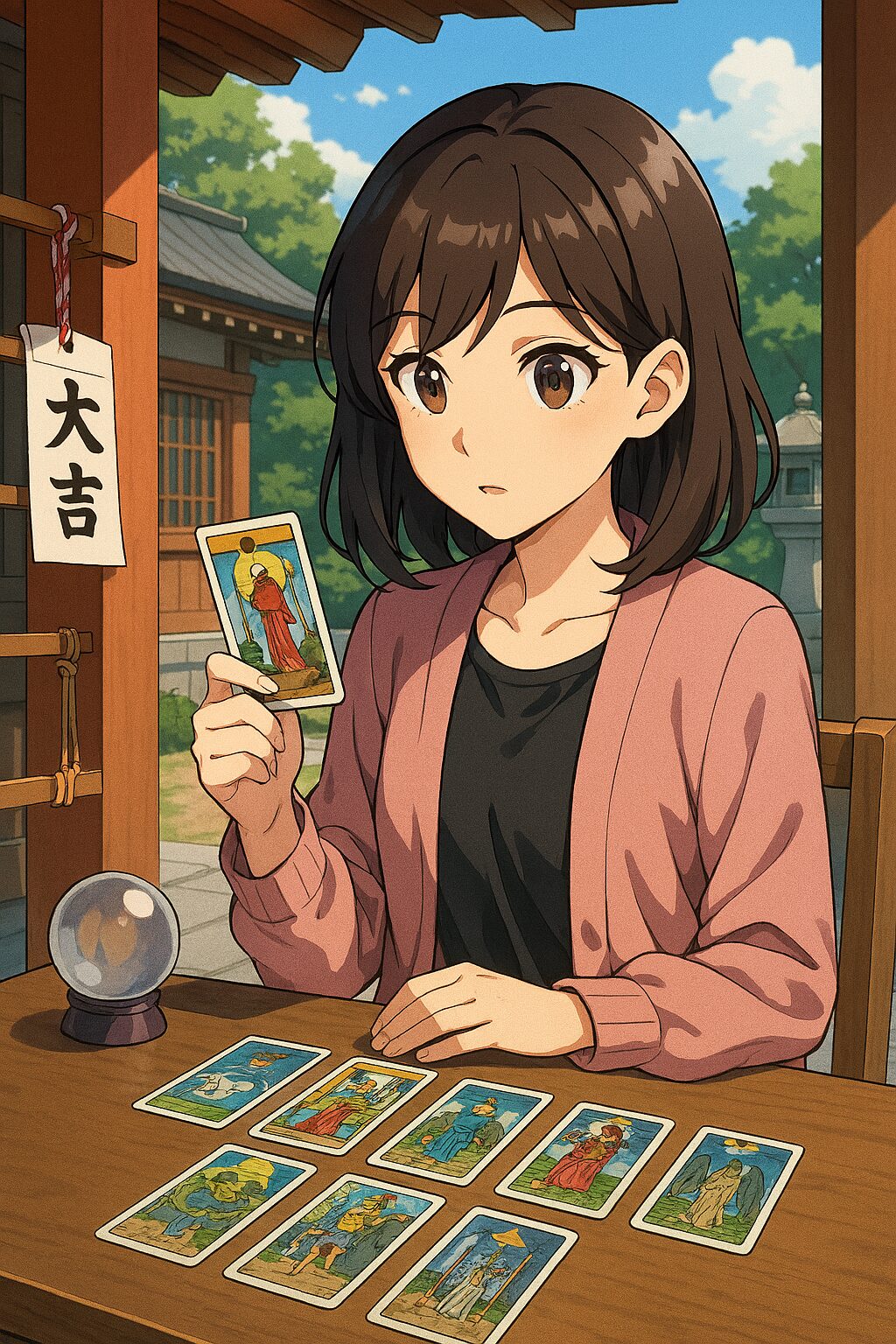—A cultural deep dive for international readers—
- Introduction: Why Do Japanese People Believe in Fortune-Telling?
- Popular Types of Fortune-Telling in Japan
- Historical Background: Fortune-Telling and Faith
- Modern Attitudes: Believe It or Just Enjoy It?
- Global Comparison: How Other Cultures View Fortune-Telling
- Psychological Role: Fortune-Telling as Emotional Counseling?
- Media and Fortune-Telling: From TV to TikTok
- Omikuji Experience: Drawing Your Fortune at a Shrine
- Conclusion: Fortune-Telling as Culture and Emotional Habit
- Further Reading
- はじめに:なぜ日本人は占いを信じるのか?
- 日本で親しまれている占いの種類
- 歴史的背景:占いと信仰の関係
- 現代の日本人と占いの距離感
- 海外との比較:占い文化の違い
- 心理的な役割:占いは“心のカウンセリング”?
- 占いとメディアの関係
- おみくじ体験:神社で運勢を引く
- まとめ:占いは文化であり、心の習慣
- 参考リンク
Introduction: Why Do Japanese People Believe in Fortune-Telling?
One surprising aspect for many visitors to Japan is how seamlessly fortune-telling blends into everyday life. Morning TV shows feature horoscope rankings, shrines offer omikuji (fortune slips), magazines publish monthly predictions, and palm readers or tarot signs dot the streets.
“I don’t really believe it, but I still check it.” This ambivalent attitude reflects how Japanese people relate to fortune-telling—not as blind belief, but as emotional reference.
Popular Types of Fortune-Telling in Japan
- Horoscopes: Based on Western astrology, using the 12 zodiac signs.
- Blood Type Personality: A uniquely Japanese idea linking blood types to traits.
- Palm Reading: Reading the lines of the hand to reveal fate and personality.
- Tarot Cards: Popular among younger generations for love and career advice.
- Name Divination: Using the number of strokes in a name to predict fortune.
- Omikuji: Fortune slips drawn at shrines, offering advice and luck ratings.
Historical Background: Fortune-Telling and Faith
Japanese fortune-telling has roots in ancient Chinese philosophies like Yin-Yang and the I Ching. During the Heian period, onmyoji (court diviners) used astronomy, calendars, and directional rituals to guide imperial decisions.
Fortune-telling also connects deeply with Shinto and Buddhist traditions, reflecting a cultural respect for unseen forces and spiritual balance.
Modern Attitudes: Believe It or Just Enjoy It?
Today, most Japanese people treat fortune-telling as entertainment or emotional support. It’s commonly used during life transitions—romance, job changes, moving homes, or even choosing a lucky day to buy a wallet.
Interestingly, many understand it lacks scientific proof, yet still find comfort and clarity in the process. This reflects Japan’s cultural tendency to value intuition and emotional resonance over strict logic.
Global Comparison: How Other Cultures View Fortune-Telling
- USA: Often seen as entertainment; some reject it for religious reasons.
- UK: Astrology is more academic, with formal schools and certifications.
- Italy: Zodiac signs are part of daily conversation and social identity.
- India: Astrology plays a major role in marriage and career decisions.
- China: Feng Shui and Four Pillars of Destiny are widely practiced.
Psychological Role: Fortune-Telling as Emotional Counseling?
In Japan, fortune-telling often serves as a form of emotional care. While Western cultures may turn to therapists, many Japanese people consult fortune-tellers to verbalize their worries and gain perspective.
Through symbolic messages, people reflect on their feelings and find encouragement—making fortune-telling a gentle form of self-dialogue.
Media and Fortune-Telling: From TV to TikTok
Fortune-telling is deeply embedded in Japanese media. Morning shows rank zodiac signs, magazines offer monthly predictions, and social platforms like YouTube and TikTok feature tarot readings and personality tests.
Digitalization has made fortune-telling more accessible and trendy, especially among younger audiences.
Omikuji Experience: Drawing Your Fortune at a Shrine
When visiting Japan, try drawing an omikuji at a shrine. These paper fortunes offer insights into love, health, work, and more. If the result is bad luck, you can tie it to a tree branch to “leave the misfortune behind”—a uniquely Japanese ritual.
Conclusion: Fortune-Telling as Culture and Emotional Habit
For Japanese people, fortune-telling is more than predicting the future—it’s a cultural habit and emotional tool. Whether you believe in it or not, it offers a moment to pause, reflect, and connect with your inner self.
Further Reading
- Fortune-Telling Around the World (Picora)
- Fortune-Telling vs. Counseling (note)
- Global Fortune-Telling Cultures (DMM Eikaiwa Blog)
日本人と占い:日常に息づく“運命”との対話
〜海外の読者に向けた、日本文化の奥深い一面〜
はじめに:なぜ日本人は占いを信じるのか?
日本では、占いが日常生活に自然と溶け込んでいます。朝のテレビ番組、神社のおみくじ、雑誌の運勢特集など、占いは「信じるもの」というより「楽しむもの」「参考にするもの」として受け入れられています。
日本で親しまれている占いの種類
- 星座占い:西洋占星術に基づき、12星座で運勢を占う。
- 血液型占い:性格をA型・B型などで分類。日本独自の文化。
- 手相占い:手のひらの線から運命や性格を読み取る。
- タロット占い:カードの絵柄から未来を予測。若者に人気。
- 姓名判断:名前の画数から運勢を占う。命名時にも使われる。
- おみくじ:神社で引く運勢くじ。吉凶やアドバイスが書かれている。
歴史的背景:占いと信仰の関係
古代中国の陰陽五行や易経の影響を受け、日本では平安時代に陰陽師が活躍しました。占いは神道や仏教とも結びつき、「見えない力を尊ぶ」精神性が根付いています。
現代の日本人と占いの距離感
多くの日本人は占いを「信じる」よりも「参考にする」存在として捉えています。恋愛、転職、引っ越しなどの人生の節目で占いを活用する人も多く、心理的な支えとして機能しています。
海外との比較:占い文化の違い
- アメリカ:合理主義が強く、占いはエンタメ扱い。
- イギリス:占星術が学問として認知されている。
- イタリア:星座占いが生活に密着している。
- インド:占星術が人生の選択に深く関わる。
- 中国:風水や四柱推命が主流。占い師の街も存在。
心理的な役割:占いは“心のカウンセリング”?
日本では、占いが悩みを言語化する場として機能しています。心理カウンセリングの代わりに占い師に相談する人も多く、心の整理や前向きな気持ちを得る手段となっています。
占いとメディアの関係
テレビ、雑誌、SNS、アプリなど、占いはメディアと密接に結びついています。若者にも身近な存在となり、デジタル化が進んでいます。
おみくじ体験:神社で運勢を引く
神社で引くおみくじは、日本文化を体験する絶好の機会です。運勢だけでなく、恋愛や仕事へのアドバイスも書かれており、引いた後に木に結ぶことで厄除けになるとされています。
まとめ:占いは文化であり、心の習慣
占いは日本人にとって、未来予測以上に「心のバランスを取るツール」として機能しています。信じるかどうかに関係なく、自分と向き合う時間を提供する存在なのです。



コメント